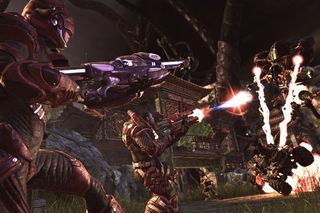Epic Games
GR: Firstly, what's your name and job role, and are you on the frontline of community relations?
Jeff: My name is Jeff Morris and I’m the senior producer at Epic Games on Unreal Tournament 3. I interface with the fans primarily through the forums, but the server admins and dedicated mod folks get even more of my time.
GR: Do developers really listen to gamers? Or should gamers stick to gaming and leave developing to developers?
Jeff: Definitely, though obviously one gamers’ nirvana is another gamers’ pit of hell. Balancing what our team finds fun with what forum posts request is a fine balancing act.
GR: How valuable is it to Epic to have a lively, well established community? What are the real gilt-edged benefits?
Jeff: Absolutely. For a game with a huge mod making component we depend on the community to keep fresh content being available. We also are deeply in debt to all our server operators who through their own blood, sweat and tears give folks a great place to play UT3.
GR: How much attention do Epic give to the opinions/suggestions of people beyond its own dedicated community? Do you spend significant time sifting through a broad selection of gaming forums?
Jeff: We tend to focus on UT fan forums such as Beyond Unreal, as well as the official Epic ones as our primary feedback mechanism. After major releases, whether the retail box or a patch, we spend a lot of time crawling the forums looking for issues, ideas and the like.

Above: Post release, the lifespan of games like Epic's Unreal Tournament 3 are massively prolonged by the modding endeavors of the community
GR: Have ideas generated within the community - on your own forums, for example - ever made it into your games?
Jeff: Without question. The most common fixes are exploits, which our community are experts at finding. Within the first 24 hours of a game’s public release, you’ll get more testing on it than all your in-house testing since the inception of the product. That kind of brute force exploit hunting just can’t be beat and we roll fixes for those issues into future releases.
GR: How are ideas/suggestions offered within the community relayed to the rest of the team for consideration? Do you have dedicated meetings for that kind of thing?
Jeff: We share particularly informative ones definitely, but mainly it’s a place to hear what people think are important.
GR: Does community feedback genuinely help to make better games? Has the industry as a whole benefited from the rise of communities?
Jeff: For the most part, though there is a risk in listening only to one group of people. For instance, listening only to expert players may have you introduce features that only the hardcore will enjoy. You need to balance the fans perspective with your own knowledge to come up with the best approach.
GR: After a game is released and in the hands of gamers, what feedback is more important to Epic - what the community/forums are saying, or the opinions of professional reviewers/critics?
Jeff: They’re rarely that divergent. Community feedback is an ongoing process, where review feedback tends to be fire and forget, so if I had to choose one over the other, I’d take the forums.
GR: Hypothetical question: If you decided to trash all your community support tomorrow, do you think it would affect the sales of your games?
Jeff: I think so.
GR: So without a community, Epic would be...
Jeff: …bankrupt since we wouldn’t have anyone to sell our games to!
Epic really does listen! So get yourself involved on the Epic community forums and make yourself heard.

